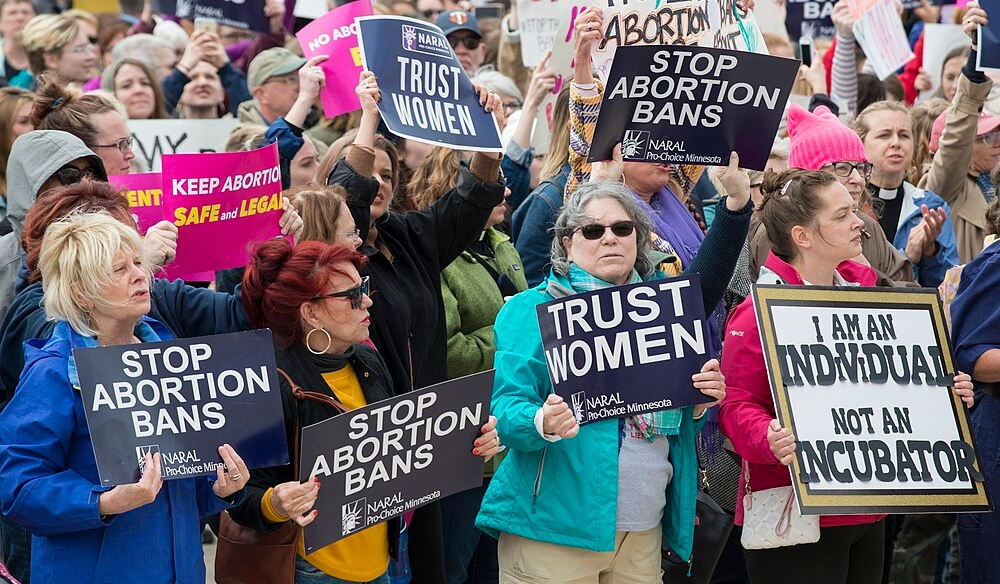Sen. Patty Murray talked incessantly of abortion rights during her 2022 reelection, decrying the Dobbs decision in which the U.S. Supreme Court reversed its 1973 Roe v. Wade decision.
Murray won a surprising landslide sixth term in an election where Democrats turned back predictions of a Republican “red wave.” Every Democratic Senator seeking reelection won a new term. The Dems swept the swing state of Michigan, gained governorships, and surprised everyone with their near-win House showing.
We saw a repeat last year in Ohio, the most conservative of America’s large industrial states. The Republicans sought to require a super-majority to amend the state constitution, but voters would have none of it. They voted down the super-majority in a late summer primary, and then voted in November to enshrine abortion rights in the state constitution.
All told, seven states have cast ballots on abortion rights. The pro-choice forces have won every time, starting with a landslide win and big turnout in conservative, Republican Kansas. And they’re going for more this year, and hoping the issue boosts Joe Biden to victory in November.
The latest measures to qualify for the ballot have come in Missouri and South Dakota. In the “Shòw Me” state, pro-choice forces have turned in 380,159 signatures on ballot petitions (the threshold for making the ballot is 170,000). In South Dakota, where 35,000 were needed, 55,000 ballot signatures have been turned in.
The states’ Republican rulers are trying a reprise of the Ohio gambit, tilting the odds for an election. In Missouri, a legislative proposal would require that voters in at least five (of eight) congressional districts give thumbs up to amenďing the state constitution. In South Dakota, a GOP-dominated legislature has made provision for citizens to withdraw their signatures. Hostile ballot wording was tried last year in Ohio, and this year in Missouri.
Other states are likely to vote on abortion rights notably Arizona, which is pivotal in the presidential race. The Arizona Supreme Court recently upheld an 1864 territorial law which imposed an almost total ban. Legislators promptly overturned the ruling, and pro-choice advocates are pressing for further liberalization.
The South Dakota measure would prohibit legislators from interfering with “a pregnant woman’s abortion decision and its effectuation” during the first trimester of a pregnancy. Later, in the second trimester, lawmakers could impose regulation “reasonably related to physical health” of a pregnant woman.
Another battle is underway in Florida, where a ban on abortion after six weeks of pregnancy has just taken effect. The Sunshine State had been about the only place in the Deep South where women could go to terminate a pregnancy.
U.S. Supreme Court Justice Samuel Alito has been feted by the right-to-life movement as author of the Dobbs decision, which returned abortion policy to the states. It is, however, turning out that the public is hostile to state intrusion in a very personal and private decision. Moreover, an unpopular ruling by the Supremes’ conservative super-majority has proven a boon to progressive politicians.
The late Supreme Court Justice Ruth Bader Ginsburg, a champion of women’s rights, had trepidations about Roe vs. Wade, fearing it would trigger a backlash. The recent backlash has, however, come from the opposite direction.
Joe Biden cast anti-choice votes early in his 36-year Senate tenure. He has become as champion of choice, as opposition to abortion rights in the Democratic Party has virtually vanished. (One of the party’s last right-to-life lawmakers, Rep. Henry Cuellar of Texas, was indicted on Friday.)
The issue on which Biden has changed positions could well elect the next President.
Discover more from Post Alley
Subscribe to get the latest posts sent to your email.

This is why we need to repeal the 17th Amendment. The 17th Amendment provided for the direct election of US senators, whereas, state legislators had perviously elected their state’s senators. It’s time to make senators accountable to their state houses once again.
(?!)
LOL not happening.
Ah, just when I thought you couldn’t be any more of an idiot here you go and out yourself.
Nice work!
Offshore poster? Bot? Both!?
Note: zero chance the 17th amendment is repealed.